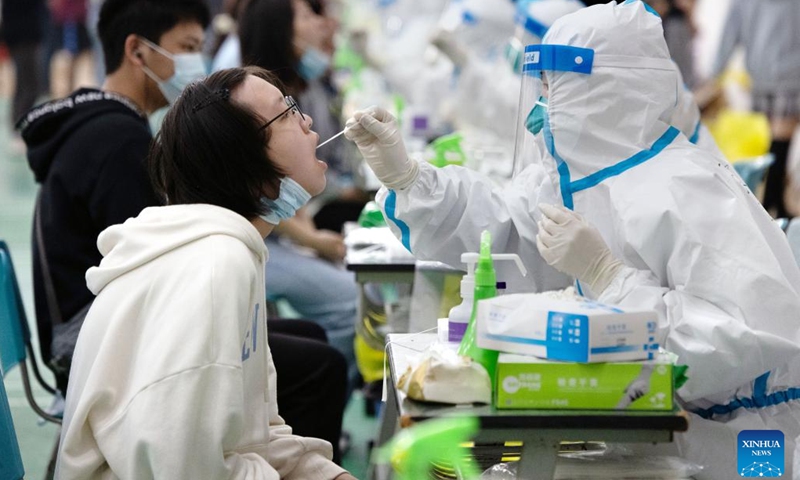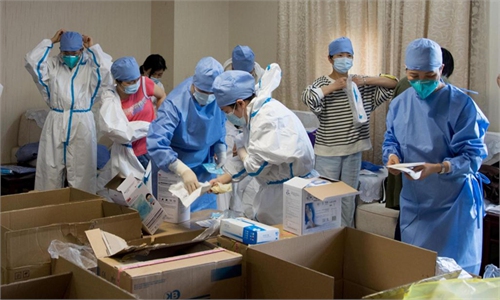
A medical worker takes a swab sample from a student for nucleic acid test at a university in Qingpu District of east China's Shanghai, March 14, 2022.(Photo: Xinhua)
Shanghai reported 979 asymptomatic COVID-19 cases on Wednesday, the highest daily number in the Chinese mainland. With the gradual adoption of an updated COVID-19 playbook and targeted nucleic acid testing scheme, the city is rushing to get ahead of the virus, through screening, testing and quarantining silent carriers.
China reported 2,722 asymptomatic cases on Wednesday, with 979 from Shanghai. Data provided by the Shanghai Municipal Health Commission on Thursday showed that among the 979 asymptomatic cases, 878 were detected among people already in quarantine.
In order to curb the surging number of asymptomatic cases and race against the virus, Wu Jinglei, director of Shanghai's Health Commission, said at a press briefing on Thursday that Shanghai will adjust its COVID-19 policies to make mass testing more precise and shorten the time for completing testing. According to the updated playbook on nucleic acid test, tests should be completed in designated areas within 24 hours.
Shanghai's quarantine measures for mild cases have been gradually updated with the country's ninth version of the COVID-19 playbook released last week, which ordered that COVID-19 patients with mild symptoms should go to centralized quarantine facilities instead of being hospitalized.
The Global Times learned from Shanghai health authorities on Thursday that mild cases and asymptomatic infections will be quarantined in centralized venues, but quarantine sites are not limited to traditional medical institutions.
A 24-year-old woman who lives in the Xuhui district of Shanghai and has mild symptoms told the Global Times on Thursday that she is quarantined at a designated hospital with only some cold-like symptoms.
"A nurse will help me with a nucleic acid test at 7 am each day, and the doctors will check with me regularly. They gave us traditional Chinese medicine - a box of Lianhua Qingwen - this afternoon as prevention."
The Shanghai Public Health Clinical Center, as the earliest designated hospital for COVID-19 patients' treatment, has become overloaded, said the patient.
The disease control and prevention authorities also face the pressure of overloading when they need to transfer positive cases.
Wu noted that Shanghai has renovated two indoor stadiums as centralized quarantine sites for mild COVID-19 cases and asymptomatic carriers.
Affected by COVID-19, at least 39 medical institutes in Shanghai were suspended, local authority said.
Speaking on his Sina Weibo account, Zhang Wenhong, head of the Shanghai panel overseeing the treatment of COVID-19, said that Shanghai is fighting the toughest battle yet with the coronavirus, the infections have exceeded anticipations and medical resources are strained.
Zhang also acknowledged issues raised by some residents, such as the "lives of people living in epidemic-restricted areas are not well guaranteed, the restriction period is too long, and frequent restrictions of hospitals cause inconvenience for other patients." He said those problems should not be evaded.
Despite those problems, Zhang said Shanghai has built up the capability to win against Omicron, explaining that on the day when the new revised guideline on nucleic acid testing was released, Shanghai gave priority to "strictly screening out cases and increasing testing capability" and stressed the importance of close coordination and relocation of resources.
But the recent good news is that only 10 percent of the total infections were found in non-quarantined areas, and the caseloads in those areas are shrinking, said Zhang, noting that Shanghai's epidemic is showing good signs. Although the turning point is yet to come, the condition for embracing a turning point are in the making.
An immunologist who requested anonymity told the Global Times on Thursday that Shanghai is the one of the first cities to implement new measures in accordance with the new updated COVID-19 playbook and more targeted nucleic acid testing scheme.
The reason why Shanghai, as a megacity with leading medical resources and governance capacity, still faces a tough situation is that the city initially adopted very meticulous and elaborative measures to screen out COVID-19. The smaller the confined area, the stronger governance capacity it needs, the immunologist said.
Jin Dongyan, a biomedical professor at the University of Hong Kong, said the updated COVID-19 playbook and new nucleic acid testing scheme scientifically answered tricky questions to deal with Omicron.
He believed that Shanghai is capable of beating Omicron with the current anti-epidemic measures, but the process must be tough, given the nature of Omicron - sneaky and highly contagious.

